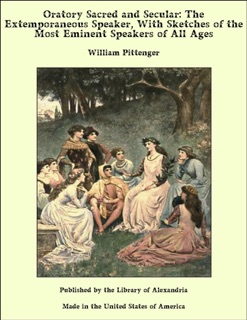The special object of the following pages is to show the manner and requirements of extempore preaching. But as this differs from other methods of speech in its objects rather than in its external qualities, many of the thoughts we present will apply as well to the bar and forum as to the sacred desk.
There is need that this subject should be enforced, particularly on the ministry. A growing desire is manifested to give up plain, direct speech, and indulge in the ease and certainty of written sermons. Young men find themselves in places where it requires unwearied exertion to sustain their reputation, and satisfy the demands of a cultivated audience. They begin to fear that their spoken sermons may be deficient in polish and style, and at last they write. The people nearly always protest against the innovation, but to no purpose, for having convinced himself that he is right, the minister treats their murmurs as the effect of vulgar prejudice, and as a frequent result, his usefulness is permanently impaired.
This evil cannot be diminished by denouncing those who engage in it, for the supposed necessity they labor under is stronger than any other consideration. But it may be lessened by showing that there is a better way, and making it plain. Such will be our endeavor.
The two extremes of speech are, the discourse which is written and read verbatim, and that in which both words and thoughts are left to the impulse of the moment. Between these there are many intermediate grades. The latter may be excluded from the classification altogether, for no wise man will adopt it except in some unforeseen emergency. True extemporization relates to the words alone, and leaves full room for the complete preparation of thought. Between this and the manuscript discourse there are various compromises which seek to combine the advantages of both. These, for the sake of convenience, may be called the recited, composite, premeditated and sketched discourses.
It is useless to deny that the method of writing in full and reading, possesses many and great advantages. It secures time for the consideration of every thought. If the mind fags, the writer can pause until it is rested and begin again; and in this way all the ideas and expressions that occur for several days can be concentrated into one sermon. Then it can be revised, and the language improved to an indefinite extent, and the sermon, in its completeness, laid away for future use.
But there are great disadvantages. Such a sermon may, by solidity of thought, and brilliancy of expression, command approval, but it will seldom move and sway the people. The very idea that all has been written out, and is merely read, will tend powerfully to neutralize its effects. We may remonstrate against this if we will, and declare that our sermons should be judged by their substance, but this does not abate the preference of our auditors. They will retort, with truth, that they can read even better sermons at home, and dwell on them at their leisure. What they want in preaching is the living sympathy and guidance of the preacher; his soul burning and glowing, and thus lighting up other souls; his eye beaming on theirs; his clear, far-seeing mind, excited by the magnetism of truth, and appealing to their hearts with an earnestness that will take no denial. This fills the popular ideal of preaching, and no elaboration, no word music will atone for the want of it. Men of great genius may succeed otherwise, but the mass of speakers cannot.






















![Capturing a Locomotive. A history of secret service in the late War. [On the Andrews Railroad Raid.]](https://is1-ssl.mzstatic.com/image/thumb/Publication/c3/65/0d/mzi.jsphyqwt.jpg/270x270bb.jpg)
















